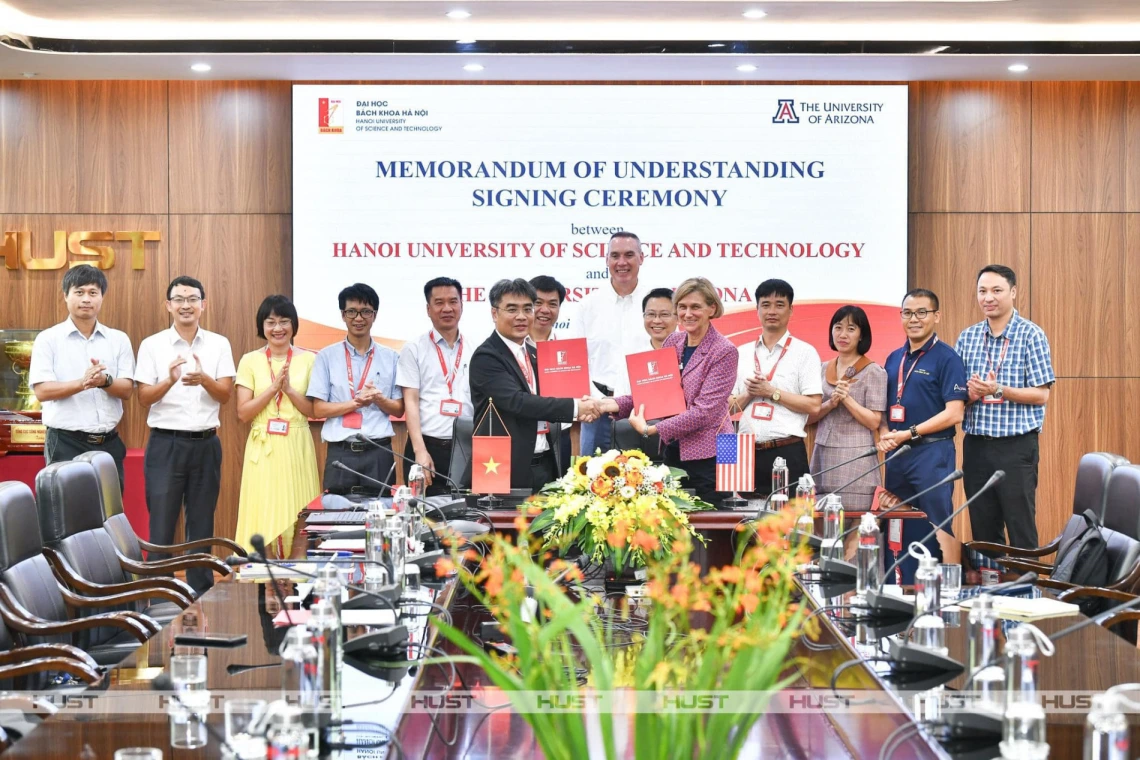College partners with international university to strengthen semiconductor sector
The University of Arizona and Hanoi University of Science and Technology sign memorandum of understanding to collaborate in the semiconductor sector and related STEM education activities.

Associate dean of research Mark Van Dyke (center, back) and vice president for semiconductor strategy Liesl Folks (center right, shaking hands) pose for a photo with HUST leaders on Aug. 1, 2024. Photo credit: Hanoi University of Science and Technology
With the explosion in global demand for semiconductors and microelectronics, The University of Arizona's College of Engineering is emerging as a leader in technology and workforce development. The school recently received $35.5M for facilities expansion and student training. And earlier this year, it hosted 150 leaders from higher education, government, nonprofits and industry to map the future of the field.
Hanoi University of Science and Technology is actively expanding its semiconductor industry training programs by leveraging partnerships with leading international enterprises, establishing new relationships with foreign universities in the Asia-Pacific, EU and especially the US. The newest expansion included signing a memorandum of understanding on Aug.1, 2024, with the College of Engineering.
During the MOU signing ceremony, leaders from both institutions discussed future cooperation opportunities such as developing training programs related to semiconductor technology and microchip technology, exchanging students, faculty, educational resources and research achievements.
“HUST is one of the leading technical universities in Vietnam, with significant advantages in interdisciplinary engineering, providing comprehensive human resources for the semiconductor technology chain and playing a pioneering role in the higher education system under the Ministry of Education and Training,” Huynh Dang Chinh, vice president of HUST, said during the event.
Highlighting the importance of collaboration with the University of Arizona, associate professor Huynh Dang Chinh affirmed HUST’s strong foundation in semiconductor technology training and its desire to develop experts in the challenging field of microchip and semiconductor technology.
UA Engineering has taken a lead role in ensuring the semiconductor industry meets its growing workforce needs. In Arizona, the university formalized an agreement with Northern Arizona University to ensure close collaboration on research and academic programs.
Craig M. Berge Dean David W. Hahn, associate dean of research Mark Van Dyke and vice president for semiconductor strategy Liesl Folks told HUST leaders they highly valued the potential for cooperation with HUST in the semiconductor sector.
“This cooperation not only promotes the semiconductor industry in both countries but also brings sustainable value, creating new opportunities for students, researchers and partner enterprises of both institutions,” Folks said.

